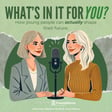
From carer to youth advocate: youth driving change
Friends!! This episode we sit down for a bit of a longer chat with award-winning youth advocate and former Australian Youth Representative to the United Nations, Angelica Ojinnaka-Psillakis. If you're a young person wondering what's in policy and politics for you, this episode is a MUST listen-to.
We break down where the journey to becoming a youth and social justice advocate actually begins, what it means to meaningfully participate in political systems and processes, and how you as a young person can start making change, today.
As always, if you're keen to learn more, give us a follow on our socials @forourfuturecampaign and @foundationsfortomorrow.
To take action, you can sign our petition for a federal Wellbeing of Future Generations Act here!
What's In It For You is a Foundations for Tomorrow podcast, produced as part of the 2025 For Our Future Campaign. It is hosted by Clare Beaton-Wells and Anna Bezzu.
Links and resources mentioned:
- Future Healthy Countdown 2030: https://www.aracy.org.au/future-healthy-countdown-2030/
- Future Healthy Countdown 2030 youth-led paper on power in decision-making: https://www.mja.com.au/journal/2023/219/10/who-holds-power-decision-making-young-peoples-future
- Future Healthy Countdown 2030 Indigenous-led paper on the participation of Indigenous children and young people to improve health and wellbeing: https://www.mja.com.au/journal/2024/221/10/participation-indigenous-children-and-young-people-improve-health-and-wellbeing
